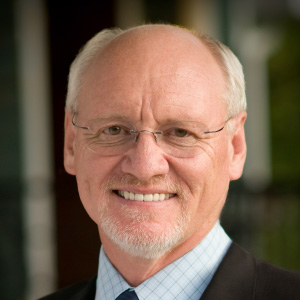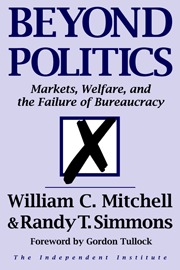California irrigators pay less than $10 per acre foot for water that costs the taxpayers over $600 to deliver to the farms. About 32,000 trade associations in Washington, DC employ 187 lobbyists per member of Congress. The total costs to consumers of tariff legislation exceed $70 billion annually. American businesses pay more than $100 billion to comply with government regulations. As a result we have fewer jobs, lower profits, reduced innovation, and higher taxes. The process was summarized years ago by political scientist Robert A. Dahl "...the making of government policy is not a majestic march of great majorities united upon certain matters of policy. It is the steady appeasement of relatively small groups."
In Herbert Stein’s April 20 editorial: "The People vs. the People," Mr. Stein argued, however, that government is just a benign institution within which people work their collective will. What he missed is that one group of people could not take advantage of other groups of people without the assistance of government. Stein appears to assume that our policies and processes that produce them are essentially efficient and fair, accurately reflecting public opinion, governed by the moderate preferences of the median voter and conducive to social harmony. If we end up with occasional inefficient and/or unfair policies, they can be blamed on the voters themselves. This can accurately be called the "high school civics" view of democracy.
As detailed in our new book Beyond Politics, we have a much different perspective on the democratic process, one informed by modern political economy or "public choice." Public choice scholars view politics as rational and self-interested and see a group struggle ending up in usually inefficient and inequitable outcomes. Neither of us accepts the extreme view that the government is necessarily the enemy of the people. We doubt that bureaucrats and politicians get up in the mornings asking how they can harm the citizens. We do, however, believe that much of what our government does is wrong-headed, dysfunctional, and even perverse. That is, politics produces outcomes that few want. Public choice economists have shown us why perverse outcomes are standard fare. We should not expect otherwise in a system where the costs and benefits of a policy are rarely internalized in the same person -- what you pay has little to do with what you can get from the system. In democracies, citizen-voters choose with and for others. Thus, we are all potential dictators, but with precious little power since each vote counts for no more than one of millions or tens of millions.
The Unromantic Side of Democracy
As the Founding Fathers had feared, and as the above examples suggest, democracy has the potential to degenerate into mutual plunder. This pitfall becomes apparent when we contrast the decision-making of voters with that of consumers. In a market economy, consumers must consider prices and their budgets before deciding what, when, and how much to buy, and usually do so with an eye to one’s future prospects and obligations. Unlike the voters’ dilemma of condensing political preferences into simple "yes" or "no" votes, the market allows consumers an easy way to express the ranking and intensity of their preferences. And because those who consume (or their willing benefactors) must pay for what benefits them, prudence is encouraged. Furthermore, because consumption decisions reflect and alter prices, other consumers (and producers) are sent a signal about the economic plans of others. These price signals provide the feedback that helps coordinate and harmonize the economic plans of all who participate in a market economy.
In democratic politics, in contrast, voters play dual roles which are often at odds; their roles as beneficiaries and as taxpayers are not directly connected. One role does not discipline the other as in the market. Self-responsible or economically prudent decision-making may be encouraged by moral suasion, but is not demanded by voters’ own budget constraints. In playing out this taxpayer role, well meaning public spirited voters can support reductions in their own tax payments while pursuing increases in benefits to themselves. Thus, citizen-voters are able to make ethical imperatives out of logically contradictory agendas. A citizen-voter, for example, might advocate increased spending on defense, social programs, and consumer protection while also promoting lower taxes, balanced budgets, and reduced government controls.
Voting for more spending seems appealing because of the intended benefits, but such good intentions are not immediately disciplined by the knowledge that someone must pay for those benefits. Besides, voters may hope that some other taxpayer, preferably a wealthy one, can be forced to finance their private desires and altruistic impulses. In politics, economic man puts on political clothes and should not be indicted for profligacy when nothing in the voting decision requires comparing prices and budgets. Besides, to not seek subsidies, feel-good social programs, or ideological preferences when others may make little sense. Everyone is caught up in a budgetary "tragedy of the commons." But this political jockeying is neither ennobling nor socially optimal.
Public Servants with Private Agendas
Elected officials realize that any given action and/or policy will please some voters, displease others, and escape the attention of most. The same action can change his power or influence with colleagues, bureaucrats, and organized interests. Reconciling these differences requires bargains, compromises, log-rolling, and in general, strategic choices. Successful politicians are those who can adopt policies which keep them in office, maintain or improve influence with other politicians, and enlist the aid of bureaucrats. This is all accomplished in an arena where the prudent citizen-voter must pay a steep price to even be informed about the costs and benefits of policy options. Voters, therefore, remain ignorant of costs while politicians remind them of benefits.
Like all political agents, politicians spend other people’s money and spend it on still others who may not have contributed to the common treasury. They face more powerful incentives to spend than to economize. One reason is that small groups who benefit from government expenditures have more incentives and cheaper means of organizing than do the diffused taxpayers. As more and more groups organize to seek governmental favors we get a near universal pursuit of protection and redistribution -- imports quotas, legalized monopolies, military weapons boondoggles, farm subsidies, porkbarrel public works projects, Medicare increases, social security COLAs, etc. All these suggest a great tragedy for modern democracies: The better a political system performs in representing the narrow interests of some citizens, the worse it may be at fostering economic progress and safeguarding the liberty of the rest. If each citizen’s collective interests are overwhelmed by the promise of seeking more immediate gains from coercive redistribution, then all will share a smaller GDP. The fundamental problem for the politician stems from his having to satisfy ever increasing demands for larger shares of a less productive economy and more reluctant taxpayers.
Rational discussion vs. rational analysis
Mr. Stein’s personal governmental experiences and academic research have contributed much to our knowledge. His book on fiscal policy, for example, contains many useful insights to our policy process. We are, therefore, somewhat disappointed at his "high school civics" analysis presented in the Journal. Although we share his sentiments about the value of rational discussion, we are not as optimistic about government acting rationally. Government processes and policies make us all worse off. All too often, government pits citizen against citizen. The solution is not simply more rational discussion but the steady reduction in the scope of government. In other words, we must de-invent government bureaucracy. If we want a more humane society, we must have fewer government programs, and greater room for peaceful, private action. The same "political entrepreneurs" who take from others through government will then have to cooperate with others in markets.
Judging by the outcome of last November’s elections, many voters have graduated from the "high school civics" notion of democratic process and now embrace the optimistic realism we share with the Founders. Hopefully, those who suffer from Beltway blindness, like Mr. Stein, will eventually learn the lesson, but this requires that they stop viewing democracy through rose-tinted glasses.








